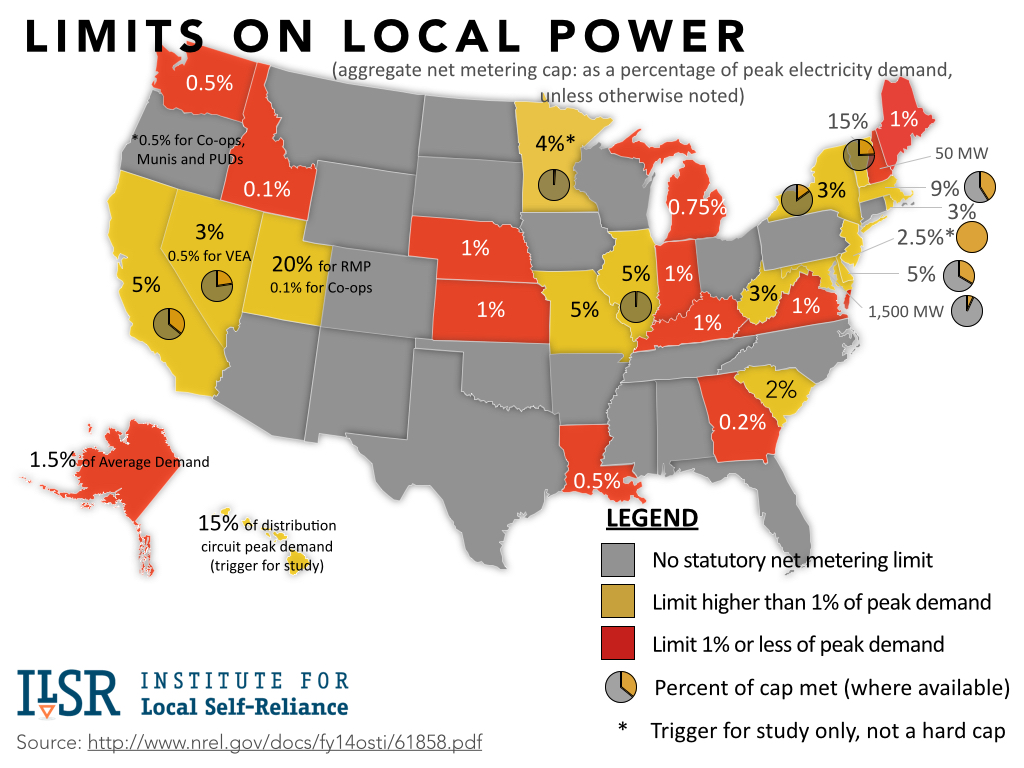This week in democratic energy, media reports discussed the recent ruling for utilities in Wisconsin, the continued growth of solar in several states, and more.
John Farrell, Director of ILSR’s Democratic Energy initiative, recently presented on a panel about the City of Minneapolis’ partnership with Xcel. His talk was covered on PVSolarReport.
ILSR’s report on the Walton family’s efforts to stall solar development also saw coverage on DeSmogBlog.
Diane Cardwell of The New York Times reports that solar and wind power are increasingly becoming cheaper than conventional sources such as coal and natural gas:
The cost of providing electricity from wind and solar power plants has plummeted over the last five years, so much so that in some markets renewable generation is now cheaper than coal or natural gas.
Utility executives say the trend has accelerated this year, with several companies signing contracts, known as power purchase agreements, for solar or wind at prices below that of natural gas, especially in the Great Plains and Southwest, where wind and sunlight are abundant.
As we mentioned last week, the Wisconsin Public Service Commission (PSC) ruled 2-1 to allow utilities to increase fixed rates and implement other changes to energy programs, most notably net metering. Mark Del Franco of Solar Industry reports:
“‘Objectives, like good public policy and clean air, were completely ignored by the PSC,’ says Michael Vickerman, program and policy director at advocacy group ReNew Wisconsin. ‘The effect on new residential solar will be nothing short of devastating.’”
According to Greentech Media, proponents of solar are preparing to sue the two commissioners who voted in favor of the rate changes. Julia Pyper reports cleantech advocates are confident in the outcome:
“‘The [commission’s] decision will not stand,’ [Bryan Miller, vice president of public policy for Sunrun and co-chairman of The Alliance for Solar Choice] added. ‘We will sue, and we will win.’”
“The most damning evidence, he said, is one of We Energies’ own studies which determined that solar benefits all ratepayers. That’s because the utility can profit from solar’s long-term fixed costs, as opposed to being impacted by the fluctuating prices of fossil fuels. PV also reduces the burden on the distribution system because it demands less electricity from the substation, and at the transmission level, ‘We Energies realizes cost savings when PV is able to reduce the peak demand.’”
Conversely, Arizona Corporation Commission (ACC) staff recommended that its commissioners reject a recent utility proposal for expansion into rooftop solar. The utility – Arizona Public Service (APS) – planned to use rate-basing to spread costs for the initiative across all customers. Gavin Bade of Utility Dive reports:
“Solar groups expressed relief at the ACC staff recommendation. ‘There is no reason for utility-owned distributed solar,’ Court Rich, vice president of the Arizona Solar Energy Industries Association, told SNL Energy.”
In Texas, a recent report by the Pew Charitable Trusts ranked the state second in the nation for clean energy job creation. Katherine Nickas of the Rivard Report writes:
“Texas is an energy powerhouse. It’s the biggest generator of electricity, home of the only independent electric grid in the country – the Electric Reliability Council of Texas (ERCOT) – and is home to the largest installed capacity of industrial energy efficiency technologies, according to a recent report released by the Pew Charitable Trusts and an accompanying webinar, ‘Clean Economy Rising.’”
A recent study finds that Minnesota can easily reach its goal of producing 10 percent of its electricity from solar by 2030. Frank Jossi of Midwest Energy News explains:
“Reaching that goal would reduce greenhouses gases by six million metric tons, the equivalent of taking 1.3 million autos off the road.”
“It would also meet 39 percent of the reduction in emissions Minnesota will need to make by 2030 to meet new carbon regulations from the Environmental Protection Agency.”
The Solar Energy Industries Association (SEIA) announced the formation of a new coalition for solar in Massachusetts. From SEIA’s press release:
“Mass Solar Coalition supports the advancement of policies and programs that support the continued growth of renewable energy throughout the Commonwealth, offer fair and equitable access to the benefits of solar for all Massachusetts electricity customers and recognize the grid, economic and environmental value that solar and distributed energy resources bring to all electricity customers in Massachusetts.”
“‘Solar energy is already paying big dividends for Massachusetts with hundreds of solar companies located across the state, employing more than 12,000 people,’ said Rhone Resch, SEIA president and CEO. ‘Today, Massachusetts has more than 580 megawatts (MW) of installed solar capacity, ranking it 5th in the nation. But we’re just scratching the surface of the state’s enormous potential. We look forward to working with Governor-elect Baker, the legislature and other stakeholders on ways to create new jobs, enhance the state’s economy and protect the environment through increased solar development.’”
These dividends can be seen in Belchertown, Massachusetts. GlobeNewswire covered a recent agreement between the town and Altus Power America, a company that invests in clean energy projects:
“Altus Power America, Inc. announced the signing of a long-term solar Net Metering Credit Purchase Agreement with the Town of Belchertown, Massachusetts. The 20-year contract will help Belchertown save on a large portion of its electricity usage and reduce its carbon footprint. Belchertown is expected to save up to $160,000 annually with estimated savings of $2.7 million over the duration of the 20-year term.”
The Environmental Defense Fund (EDF) responded to utilities’ arguments that net metering policies are particularly harmful for low-income households on the EDF blog. Jorge Madrid and Marilynn Marsh-Robinson write:
“It seems peculiar to us that this industry group would take such an aggressive stance against net metering on behalf of low-income families. But, a look at the full story adds clarity to the group’s intentions. Analysis from a recent Lawrence Berkeley National Laboratory study shows that, even under the most aggressive expansion of solar power the researchers studied, shareholder (or utility) profits would be impacted more financially from net metering than customers’ electricity rates. It would appear these efforts to attack net-metering policies are more about disruptions to profits than negative impacts to low-income people or other customers.”




